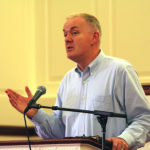Just a reminder concerning how this blog operates. The fact that someone is quoted here does not mean that I agree with everything that person might teach elsewhere. It simply means that this particular article/quote/video was something I found to be useful and insightful.
As the saying goes, “even a broken clock is right twice a day.” The fact that the clock is referred to in the moment it is telling the correct time, does not mean that I am not aware that it is inaccurate the rest of the time.
The following is from Dr. Tim Keller (original article here)
The doctrine of election—that those who freely come to God are those whom God has freely chosen—is easy to understand, and clearly taught in God’s Word, but it is not easy to accept. It has given thoughtful believers problems for centuries, and continues to do so today.
Here are three of the most common questions the doctrine of election raises:
1. If you believe in election, doesn’t that leave you with the problem of why God doesn’t choose to save everyone?
Yes, but the same is true for Christians who don’t believe in election. Election doesn’t create the problem, it only leads us to think about it. To deny the doctrine of election does not help you escape the issue. All Christians have this problem, and so we cannot object to election by appealing to it. A person who doesn’t believe in election faces this dilemma:
(a) God wants everybody saved.
(b) God could save everyone.
(c) God does not.
The question, though, still remains: Why not? That is the ultimate mystery, but abandoning the doctrine of election does not answer it.
Someone says: “But I believe that though God doesn’t want us to be lost, some are lost because they choose wrongly and God will not violate their freedom of choice.” But why is freedom of choice sacrosanct? I try to honor my child’s freedom of will, but not if I see he is about to be killed by it! Why can’t God “insult” our freedom of will for a moment and save us for eternity?
Regardless of whether you think we are saved by our choice or by God’s, you still face the same question: Why wouldn’t God save us all if he has the power and desire to do so? Again, it is a hard question, but it cannot be used as an argument against the doctrine of election.
We can go further. Suppose election is not true. Suppose that eons ago God set up salvation on this system: Every person will have an equal ability to accept or reject Christ, who will die and be raised and be presented through the gospel message. The moment God determined to set up salvation on that system, he would’ve immediately known exactly which persons would be saved and which would be condemned on that basis. So the minute he “set it up,” he would be de facto electing some and passing over others. We come out to the same place. God could save all, but he doesn’t.
So why doesn’t he? We can only know two things. First, the answer must have something to do with his perfect nature. He is perfectly loving and perfectly righteous, and neither can be preferred over the other or he wouldn’t be God. Somehow the answer has to do with his being consistent with himself. Second, we cannot see the whole picture. Why? If we can conceive of a more merciful system of salvation than God has, we must not see it rightly, for God is more merciful than we can ever imagine. Indeed, when we finally see the whole plan and answer, we will not be able to find fault with it.
2. But if everything is fixed and certain, why pray, evangelize, or do anything at all?
This objection is short-sighted. First, if everything was not planned by a holy and loving God, we’d be absolutely terrified by the prospect of even getting up in the morning. Our actions (always done with very little understanding) could have horrible consequences. Everything would depend on us! If everything was not planned by a holy and loving God, there’d be enormous pressure on Christians when we evangelize. We would know our inarticulateness could result in a person missing his or her one “chance” for salvation. It would be a horrible prospect.
Second, we evangelize and pray because of the privilege of sharing in God’s work with him. For example, a father might be able to chop wood for the stove himself, but he asks his children to learn to chop the wood and stoke the fire as well. What if the children say, “We have no incentive to chop the wood. We know that if we don’t cut it, our father will do it anyway—he won’t let us freeze!” But the father would respond, “Of course I could do it myself, but I want you to share the work with me.” The authority and the privilege of working with our heavenly Father is surely plenty of incentive. He wants to work with us and for us.
Also, we are not supposed to second-guess God. We are never to try to guess who is “elect”—ever! God calls all to repentance and so should we. In fact, the doctrine of election should give us far more hope about working with people. Why? Because no one is a hopeless case! From a human point of view, many look totally hard and lost, but since salvation is by God’s election, we should treat everyone and anyone with hope, since God calls the dead to life through us.
Therefore, God’s absolute sovereignty is a motivation to evangelize, not a discouragement. In Acts 18, Paul is in Corinth and the gospel has been rejected by the Jews there. How does God encourage Paul not to be afraid, to “keep on speaking and not be silent” (v. 9)? “I am with you, and no one is going to attack and harm you, because I have many people in this city” (v. 10). God assures Paul of his presence, his protection, and his election. And Paul responds by staying “for a year and a half, teaching them the word of God” (v. 11). The point is this: the next person you pray for and/or share the gospel with may be one of God’s elect, and you may be part of the way God has ordained to bring them to faith.
3. I believe the Bible and I see all the teaching about election, but why do I still dislike it?
My theory is that the biblical gospel is so supernatural that it always combines qualities that by natural reason and culture we cannot keep together. The doctrine of justification is one way of looking at the gospel. It combines both law and love in ways no one could have thought up. We are saved apart from the law so that now we can obey the law. All other philosophies are either law-ism (legalistic) or law-less (antinomian). Now, the doctrine of election is just the gospel viewed from another perspective. It combines the sovereignty of God and the responsibility of human beings. Here, too, we find that human cultures and philosophies cannot combine these things.
Whoever you are, you come from a culture that has saturated you in some view that’s so unbalanced that you will see the doctrine of election as something more simple and extreme than it really is. Eastern philosophies and religions have always been more fatalistic. They believe individual autonomy to be an illusion. When people from that background come to the gospel, they may see it as “just individualism.” On the other hand, Western secularism believes strongly in the right and power of individuals to determine their own course and destiny. When people from that background come to the gospel, they see it as “just fatalism.”
No matter which “side” we come from and no matter our culture or temperament, then, we must make an effort to discern the carefully nuanced balances of the gospel of free election and justification. We must remember the prejudices we bring with us to the Scriptures. And we must be willing to learn to balance out our own views.



